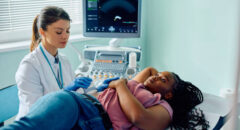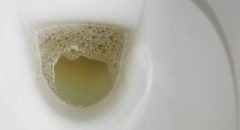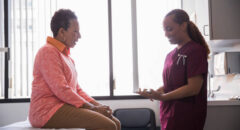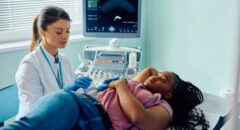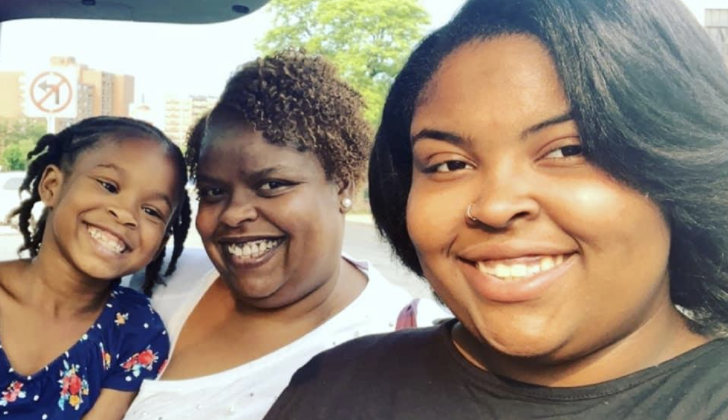
Do you have high blood pressure, heart disease, diabetes, or a family history of kidney disease? If you do, there may be a silent killer lurking within your body, and only a blood test might be the only way you can know for sure if you suffer from Chronic Kidney Disease (CKD).
Roshanda Turner, a single mother of two amazing girls shared her unfortunate and terrifying experience she had with her kidneys. A routine trip to the grocery store turned into a horrendous emergency room visit that she would never forget.
Roshanda was 35-years old at the time and pregnant with her second daughter when the doctor discovered protein in her urine after her urinalysis screening.
Roshanda said the physician informed her the results signaled that something unusual was happening with her kidneys. She was also educated that since she was pregnant and the protein wasn’t coming from the baby there was nothing that could be done until after she delivered her child.
“So, when I was pregnant is basically when I discovered something was wrong with my kidneys. I was going through that process of pregnancy when they did that 24-hour urinalysis. They send you home and tell you to complete this test and bring it back…When they called me back to go over the labs, they told me I had protein in my urine. And I didn’t know what that meant; [but] I heard that term once before when I was pregnant with my oldest daughter who is now 23. And at that time, they told me just as long as the protein wasn’t coming from the baby everything was fine. So that is how that went away 20 years prior,” said Roshanda.
Roshanda said the doctors told her, “You can’t do anything now- you’re pregnant. But once you deliver your daughter, you should go ahead and get that checked.”
Approximately six to eight months after Roshanda successfully gave birth to her healthy daughter, she said she didn’t go to the nephrologist right away. “I felt fine. So, It wasn’t until six to eight months later that [while] I was grocery shopping and [felt as if] couldn’t do my regular routine.” She noticed she couldn’t catch her breath and started feeling dizzy. “I couldn’t make it around the store and I said something is wrong and I went to the ER [because] I just didn’t know what else to do. I just knew I wasn’t okay.”
She immediately sought treatment at the emergency room and was told she was experiencing Chronic Kidney Disease and needed to follow up with a nephrologist immediately. During her hospital stay, Ms. Turner was given a blood transfusion because her condition had progressed to a dangerous level of no return.
WHAT IS CHRONIC KIDNEY DISEASE (CKD)?
Roshanda described kidney failure as similar to a teabag. “Basically, Chronic Kidney Disease is when your kidneys stop functioning. They are like a filter. So, when you think of them like a teabag, everything kind of runs through them and helps clean and balance your system. And over time, Chronic Kidney Disease starts to take that process away. So, your body is no longer able to clean and filter the way it's supposed to... And it goes into five stages before your renal failure.”
Some of the risk factors for developing kidney disease are having diabetes, high blood pressure, heart disease, or a family history of kidney failure. Roshanda explained she didn’t seek a second opinion about her kidneys after her ER visit.
“That was my mistake. The thing about kidney disease or kidney failure is it can be really silent. Sometimes there are no symptoms, there are no signs and then the symptoms that you do experience are what we normally have like fatigue. So, who’s not tired or exhausted, I just had a baby and I wrote that off. Frequent urination, I didn’t think anything of it. I wasn’t diabetic. So maybe I’m drinking too much fluid. So, there were all these things that were signs that I didn’t know were signs [and] I wasn’t paying them any attention. I thought it was just me being run down but it was so much more than that,” she said.
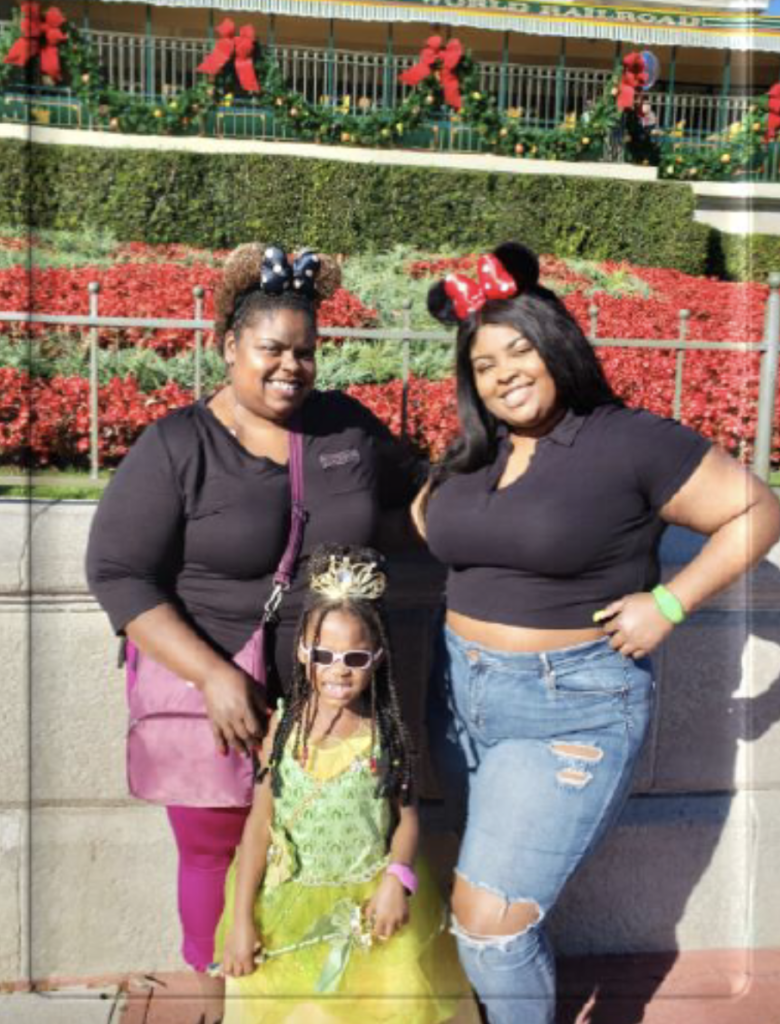
MANAGING YOUR CHRONIC KIDNEY DISEASE
After Roshanda received her diagnosis for CKD, she followed up with a nephrologist, a doctor that specializes in diseases and conditions that affect the kidneys. During this visit, the nephrologist and his staff guided Roshanda through what would become one of the most challenging moments of her life.
Roshanda stated when she got referred to a nephrologist, she went to the appointment by herself and that is the one thing she tells people not to do. “Even if you’re not sure what you’re going in there for, just go with someone. Have someone take you because I was really devastated by the information that he gave me when I went to see him...I don’t know what I was expecting but I wasn’t expecting for him to tell me I was going to need dialysis within a year,” she replied. Roshanda recalled how she sat outside the doctor’s office on a bench and cried.
She would later get some sound advice from her mother and the nurse practitioner which uplifted her spirits. “What got me off that bench and home was my phone call to my mother. Because I didn’t know what to do...She was able to talk me off the bench and talk me through...to see what the other options are because I couldn’t think that far,” she stated.
Roshanda said a week following her nephrologist appointment, her nurse practitioner called her back to the office to make sure she had a full understanding about her condition. During that time, Ms. Turner formed her support system to assist her on the new journey to overcome CKD.
The nurse practitioner said, “Listen, there are so many options, so let’s talk.” “She pulled everything together and had me rally the troops in pulling my support system and she told me to come back.” “Bring your support system-whoever that is and let’s come together and talk about your options.” During this appointment, the nurse educated Roshanda and her family about the various treatment choices like home hemo, nocturnal home hemodialysis, transplant, and her options within the center.
During this journey, Roshanda’s doctors and family pulled together to help her manage her condition after it was discovered both of her kidneys were failing. At this time, she was adjusting to motherhood, working a full-time job, undergoing dialysis, and currently awaiting new kidneys on an inactive transplant list.
PREVENTING CHRONIC KIDNEY DISEASE
Roshanda took steps to manage her disease by drastically changing her eating habits and even went as far as getting weight loss surgery to lower her body mass index (BMI) to prevent her condition from getting worse. But also maintaining a healthy weight that would allow Roshanda to move her name to the active status on the transplant list. The active status signals Roshanda’s doctors that she has met all the requirements in order to receive a kidney when it’s available. Roshanda told us she is currently working on these factors and will switch over from inactive to active after she meets those specific qualifications.
WATCHING FOR SYMPTOMS
If you have been diagnosed with CKD, Roshanda emphasized that getting tested, educating yourself, and your family about the signs and symptoms is very important. “Initially, I just remember when I was talking to my doctors…they asked who else in your family has kidney disease? And I always answered no one, I don’t know. [And then] I remember talking to my aunt and she said what’s going on? I heard something is going on with your kidneys. Well, you know Aunt Sarah was born with one kidney and you know her kids had kidney disease,” she said.
Roshanda said “How come we don’t educate each other on this information until someone is sick, right? So, what we have done as a family and that includes my siblings as well. We have let each other know what the signs and symptoms are so we can all look out for it [since we all have children].” She mentioned her niece had issues with her kidneys when she was born, so her family pays close attention to her kidney functions. “We also make sure there is no high blood pressure, there is no diabetes and if there is a first sign of that then we are addressing it,” she explained.
Ms. Turner advises others that “The answer isn’t always medication. Maybe you may need to lose twenty pounds. So those are the things we addressed [because] obesity is a big deal in my family. I waited to have the surgery and my daughter now is 23 and she is actually now considering [the weight loss surgery]. There is no reason for you to wait until you’re 45 to take control over your life if you’re truly struggling. Because that can save her from kidney failure in her later life.”
CHOOSING THE RIGHT CKD TREATMENT
Roshanda has become a champion and an advocate for herself and her family after she challenged them to be more open about sharing their health history with one another. Roshanda says her family is “very verbal” about their health now. “We try to talk about everything and try to be proactive instead of reactive,” she stated. “So, we are very open about our kidney disease, everything health-related...to prevent anything else from further happening.”
Roshanda’s diagnosis has helped her family address their health issues because prior to her getting sick, this information wasn’t shared and it may have helped her in the very beginning. She pointed out, “We just need to normalize having those conversations at the dinner table, at the Thanksgiving table, whatever it is. There needs to be some serious conversations had because I think we can prevent a lot of this from going too far. And instead of us attending so many funerals, realizing who was sick with what- we should be talking about that beforehand and helping each other through it. I hope that starts to happen for all of us.”
Roshanda believes that you should have a great relationship with your doctor and ask questions during doctor's appointments because only you can speak about your pain and conditions. “My doctor had to be really on his toes with me. And I feel like if you don’t have a doctor that you can challenge, then you probably have the wrong doctor. And I also believe in not just keeping a doctor because they are your “doctor,” like I think you get rid of them and get someone else. Like I just believe that is a thing. I feel like if you’re not happy, not satisfied in getting the answers that you need, then you need to find someone to get you what you need, find someone else to give you those answers," she affirmed.
Ms. Turner says people should educate themselves more about their health and share family history in order to change generational taboo habits of not talking about health conditions until the relative is later found deceased.
“Be an advocate for yourself, if I don’t say this enough, I tell people the perfect time to be loud is when you are advocating for yourself. If you are going to make noise, make noise about your health. If you are going to be the squeaky wheel, do it when it comes to your health...and don’t stop until you get the answers that you need and want to hear. No one else is going to do it for you. Speak up, if you don’t know then keep asking until you understand what they are talking about and tell doctors don’t talk to you in doctor jargon. Break it down into simple English, I need to understand what it is that you are saying to me and they usually will.” Said Roshanda
Roshanda praises her doctors for sticking with her through her condition because she didn’t accept him in the beginning. “For me, I didn’t like my doctor when I first met him. He told me I had kidney disease, right?! I couldn’t stand him! But he really just stuck with me and he didn’t just write a prescription that he writes every day. He wrote a prescription that was detailed for me. He found out who I was and the life that I wanted and tried to make that happen. And because of that, I had really good care and really good luck with my doctors.”
She continued, “Sometimes I need that push because I don’t know what it is, that we become kind of complacent and if it's not bothering me right now, then I can put it off until tomorrow. And we need to realize that just because we can’t see it, it doesn’t mean it’s not hurting you.” Roshanda reiterated, “That’s a big thing that I realize, just because I can’t see it or feel it doesn't mean it’s not hurting me and that is kidney disease wrapped up in a bow.”
CHRONIC KIDNEY DISEASE RESOURCES AVAILABLE TO YOU
Currently, the mother of two is a home hemodialysis patient with Fresenius Kidney Care (FKC) but originally, she started out as a peritoneal dialysis (PD) patient which provided her with the option to receive the non-blood treatment option. Ms. Turner said she later switched to the solo home hemodialysis (HHD) using the NxStage machine.
Roshanda says her HHD treatment option allows her the freedom to do dialysis safely from the comfort of her home. She is able to assist her daughter while homeschooling during COVID and maintain an active lifestyle with her family.
For more information about kidney disease click here: https://www.freseniuskidneycare.com/kidney-disease/ckd
To learn more about dialysis and how it works click here: https://www.freseniuskidneycare.com/treatment/dialysis
HELPFUL LINKS ABOUT HOME HEMODIALYSIS
For more about Roshanda’s home dialysis machine click here: https://www.nxstage.com/patients/system-one/About
https://www.freseniuskidneycare.com/treatment/home-hemodialysis
https://www.nxstage.com/patients/benefits-of-home-hemodialysis/



